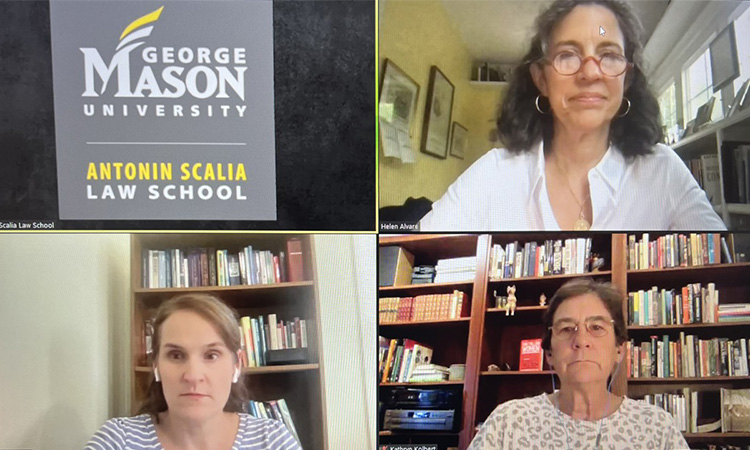Discussion over Division: Scalia Law Hosts Scholars for a Civil Dialogue on Dobbs

Two scholars on opposing sides of the abortion debate led a spirited discussion of the Supreme Court’s decision in Dobbs v. Jackson Women’s Health Organization in a webinar at the Scalia Law School on July 21.
A virtual audience of more than 100 attended the event, which Dean Ken Randall described as “a reasoned, sophisticated, and civil conversation in the best tradition of our school and our democracy.”
Moderated by Associate Dean for Academic Affairs Helen Alvaré, the webinar featured Erika Bachiochi, a pro-life attorney and author of numerous books and articles on pro-life feminism, and Kathryn (Kitty) Kolbert, a pro-choice attorney who argued on behalf of Planned Parenthood in the Casey case, which affirmed Roe v. Wade’s holding granting a constitutional right to abortion.
Bachiochi described the Dobbs holding as a “master class in constitutional opinion.” She pointed out that it was “incoherent” to claim that abortion is a protected liberty under the Fourteenth Amendment and emphasized that no one—not even women’s advocacy groups—made such a claim at the time of Roe. She took issue with the dissent’s claim that women’s voices in the abortion debate were silenced in the pre-Roe days and would be silenced again after Dobbs. Bachiochi cited the writings and work of women’s-rights advocates of the 19th and early 20th centuries who strongly opposed abortion. They believed that access to abortion would shift the balance of power toward men by taking from women their right to control “voluntary motherhood”: when to conceive and with whom. Their arguments anticipated those of feminists such as Catharine MacKinnon 100 years later, who contended that abortion facilitates women’s sexual availability.
Bachiochi also pointed out that corporations have jumped on the pro-choice bandwagon because facilitating abortions is cheaper than helping parents care for children. Instead of focusing on whether to legalize abortions—nationally or at the state level—she continued, legislators should allocate funds to programs that facilitate bearing and raising children, such as prenatal care, family leave, and day care. Doing so will level the field for parents and relieve the business community of painful cost-benefit decisions.
Kolbert decried Dobbs as “the most radical decision in recent history and probably since the early part of the 20th century.” She cited five reasons for her argument. First, she said, Dobbs is the only Supreme Court decision that takes away an unenumerated right, pointing out that all the cases the majority cited for overruling the precedent of Roe involved granting or expanding rights. Second, the holding “lays out a roadmap for taking away other unenumerated rights,” including contraception, in-vitro fertilization, interracial marriage, same-sex marriage, and the right to travel. Third, Dobbs “eliminates stare decisis as we know it and puts a damper on the Court’s institutional integrity.” Fourth, the holding is a case that turns on judges’ political views, thus further undermining the Court and its ability to “say what the law is” under Marbury v. Madison.
Finally, Kolbert said, the Court “did not respect what it means for women’s health when you take away the right to an abortion. This is the most radical part of the decision.” She cited physicians’ rights and obligations surrounding ectopic pregnancies, contraception, and post-miscarriage procedures, all of which have already created confusion in the weeks following the Dobbs decision.
Kolbert took issue with Bachiochi’s assertion that legislatures now have the opportunity to shift resources toward childcare and child services. “The same legislators who oppose abortion also oppose more funding for childcare,” she said. Still, Bachiochi hopes that the post-Roe era will provide enormous opportunity for political realignment in the interests of children and their parents. “The strange bedfellows of the past might not be as likely in the future,” she said.
“Our school always seeks to present the substantial and best arguments on both sides,” Alvaré said afterwards. “Tonight we believe we have provided a space for a civilized and substantive discussion where both sides are being heard and discussed rationally and deeply. We owe that to our students, our alums, and the community.”